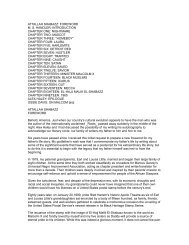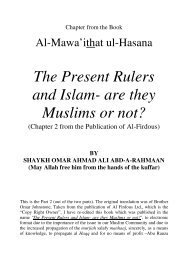Create successful ePaper yourself
Turn your PDF publications into a flip-book with our unique Google optimized e-Paper software.
The Asiatic Brethren llluminati aberration had lodges in<br />
Prague, Innsbruck, Berlin, Frankfurt and Hamburg. 150 Itzig was<br />
a member of <strong>the</strong> Berlin Asiatic Brethren.<br />
Arnstein's bro<strong>the</strong>r-in-law was also a member of <strong>the</strong> Vienna<br />
lodge. 151 His name was Bernhard von Eskeles (1753-1839). 152<br />
Eskeles married Itzig's sister Cecelia. Arnstein's wife was<br />
known as <strong>the</strong> Baroness Fanny. His daughter Charlotte<br />
became <strong>the</strong> wife of Metternich's chief banker, Leopold Edler<br />
von Hertz (1767-1828). 153 Her cousin (son of Solomon and<br />
Maria-Anna nee Arnstein) Leopold and five of his children<br />
embraced Christianity in 1819.<br />
While Frederick William II wished it <strong>to</strong> be forgotten after<br />
assuming <strong>the</strong> throne that he was an llluminatus. It was public<br />
knowledge that he was given <strong>to</strong> Rosicrucian mysticism. 154 In<br />
1790, <strong>the</strong> Toleranze Lodge was founded in Berlin by<br />
prominent German Jewish financiers. They approached <strong>the</strong><br />
Grand Lodge of Germany <strong>to</strong> grant <strong>the</strong>m an approved<br />
constitution, but <strong>the</strong>ir request was refused. The banker Itzig<br />
was able <strong>to</strong> procure a letter of approval from King Frederick<br />
William, and <strong>the</strong> King consented "<strong>to</strong> <strong>to</strong>lerate <strong>the</strong> lodge in<br />
question, and <strong>to</strong> protect it as long as it harbored no tendencies<br />
<strong>to</strong>wards illuminatismus and <strong>to</strong>ward enlightenment." 155<br />
Katz informs us that illumnatismus means "an order which<br />
had gained no<strong>to</strong>riety for social and political extremism." So we<br />
see that <strong>the</strong> King of Prussia, Frederick William II, also tried <strong>to</strong><br />
lead a double life, outwardly a man of conservative views, but<br />
inwardly a radical. We can also learn from <strong>the</strong>se royal pro-<br />
nouncements that Enlightenment and llluminatism were held<br />
<strong>to</strong> be synonymous.<br />
At this point, we may well ask ourselves what Frederick<br />
William had <strong>to</strong> gain from this type of activity in terms of his own<br />
self-interest, which would be <strong>the</strong> throne of Prussia. Aside from<br />
any ego satisfaction that he may have harbored as a Prince or<br />
Magus King of an enlightened organization, or belief in <strong>the</strong><br />
immortality of his soul (as preached by Pla<strong>to</strong> in his Phaedon),<br />
106




